We may not have the course you’re looking for. If you enquire or give us a call on + 1-866 272 8822 and speak to our training experts, we may still be able to help with your training requirements.
Training Outcomes Within Your Budget!
We ensure quality, budget-alignment, and timely delivery by our expert instructors.
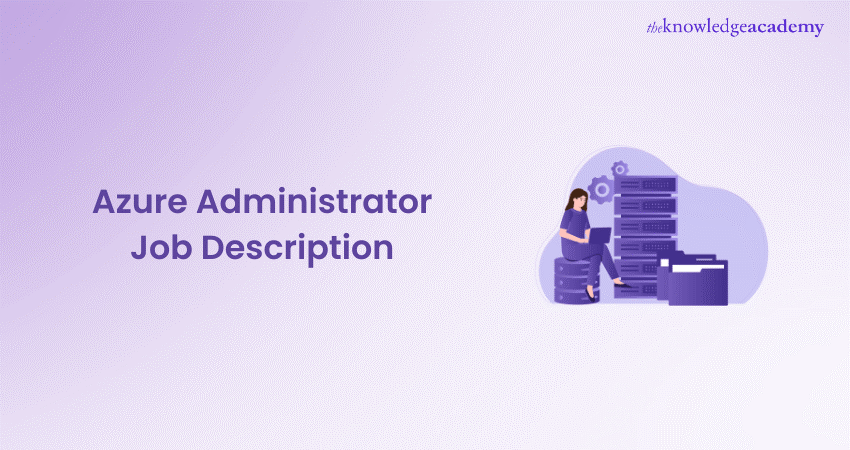
As Cloud Technology elevates industry operations to new, exciting heights, do you wonder what it takes to be the digital maestro behind seamless Cloud operations? That's who Azure Administrators are, orchestrating the Cloud environment and harmonising its performance, security, and scalability. Consequently, the Azure Administrator Job Description is a highly sought-after career choice in this age of increasing Cloud adoption.
This blog illuminates the most essential aspects of the Azure Administrator Job Description, including the dynamic responsibilities, required skillsets, salary range, and more. Read on and ensure excellence in this cutting-edge career path!
Table of Contents
1) Who is an Azure Administrator?
2) Roles and Responsibilities of Microsoft Azure Administrator
3) Steps to Becoming an Azure Administrator
4) Azure Administrator Job Description Template
5) Azure Administrator Salary Insights
6}) Conclusion
Who is an Azure Administrator?
As per Microsoft, an Azure Administrator has the knowledge essential to monitor, maintain, and implement Microsoft Azure solutions. These solutions include many storage, security, network, and computing services. Azure Admins are also skilled in cloud infrastructure for various public clouds such as AWS and Google Cloud. An Azure Administrator works as an essential team member and knows how to implement Cloud infrastructure.
Roles and Responsibilities of Microsoft Azure Administrator
The role of a Microsoft Azure Admin is pivotal, with many responsibilities crucial to the organisation's operations. Let's delve into some key responsibilities an Azure Administrator fulfils daily.
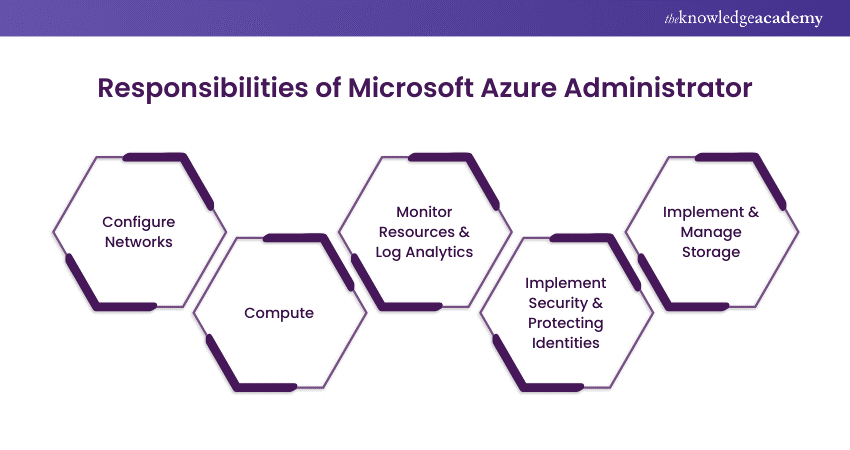
1) Configure Networks: The Azure Networking Stack, with its intricate TCP/IP inter-networking, presents a challenging yet engaging landscape for IT experts. The hardware supporting this stack may not be visible, but the complexity it adds to Azure Administration is undeniable. Thus, a key aspect to be familiar with to become a successful Azure Admin includes:
a) Routing path orchestration, especially in a hybrid Cloud
b) Setting up and establishing virtual networks
c) Managing private & public IP addresses for virtual machines
2) Compute: As an Azure Admin, you will mainly be identified with IaaS, which ultimately simmers down to running VMs or virtual machines in the Cloud. Thus, you will need to have familiarity with at least one of these hypervisor platforms-
a) Microsoft Hyper-V
b) VMware vSphere
A few VM-associated administrative tasks include:
a) Configuring VM for performance, security, and optimum cost
b) Deploying VMs into VNs (virtual networks)
c) Backing up VMs
d) Offering Fail-over recovery
3) Monitor Resources & Log Analytics: It is essential to know how to use log analytics in the Azure portal, which will aid in writing Azure Monitor Log queries. Having a good understanding of performing the below-mentioned tasks is also essential:
a) Export & share queries
b) Filter and group results
c) Save and load queries
d) Understand the schema of the data
e) Create charts
f) Use analytics for writing simple queries
g) Apply a time range
4) Implement Security & Protecting Identities: When we talk about Azure public Cloud, the stakes around security are high because an organisation is storing all its proprietary data on an infrastructure that belongs to someone else. Basic representative skills are essential and include:
a) Encrypting data at rest, in use, and transit
b) Protecting Azure Active Directory accounts from getting compromised
c) Reducing the attack surface of all Azure resources
5) Implement & Manage Storage: Azure leaves administrators with almost limitless storage since much of it is needed for storing database files, potentially useful data, VM virtual hard disks, and application data. Knowledge of PowerShell or CLI commands is important to aid in creating or removing storage.
Become a master at managing Cloud services through our Microsoft Azure Administrator AZ104 Course – Sign up now!
Steps to Becoming an Azure Administrator
Consider these insights on how to embark on the career path of an Azure Administrator:
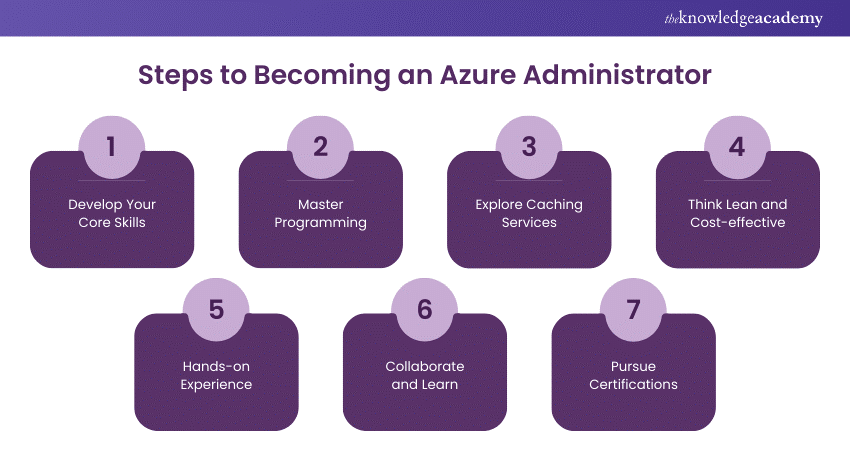
1) Develop Your Core Skills: Hone your server, database, and networking skills. Understanding the fundamentals of these areas is essential for managing Azure resources effectively. Familiarise yourself with concepts like storage accounts, virtual machines, and networking configurations.
2) Master Programming: Strengthen your programming skills, which are vital in creating efficient solutions and automating tasks in Azure. Focus on languages like Python, PowerShell, or JavaScript, as they are widely used in the Azure environment.
3) Explore Caching Services: One skill required in any job description for Azure Administrators is the ability to explore caching services. So, get familiar with caching services such as Azure Redis Cache. Caching enhances application performance by reducing database calls and optimising data access. Understanding caching mechanisms will be beneficial in your role as an Azure Administrator.
4) Think Lean and Cost-effective: In the Cloud, optimising costs is crucial. Learn to design and implement solutions that are lean and cost-effective. This involves selecting the right type and size of Azure resources to meet the organisation's needs without unnecessary overhead.
5) Hands-on Experience: Practical experience is invaluable. Create your Azure account and start experimenting with different services. Work on real-world projects and challenges to gain confidence in your abilities.
6) Collaborate and Learn: While a Microsoft Azure administrator job description may not be a standard requirement, joining Azure user groups and forums can be a game-changer. Participate in discussions, pose questions, and share knowledge to accelerate learning and find opportunities to collaborate with industry experts.
7) Pursue Certifications: Earning certifications is not just an excellent way to validate your Azure skills and boost your credibility as an Azure Administrator. Consider taking exams and other relevant certifications to showcase your expertise to potential employers.
Looking to expand your expertise in building, testing, and maintaining Azure solutions? Sign up for our Developing Solutions For Microsoft Azure AZ-204 Certification now!
Azure Administrator Job Description Template
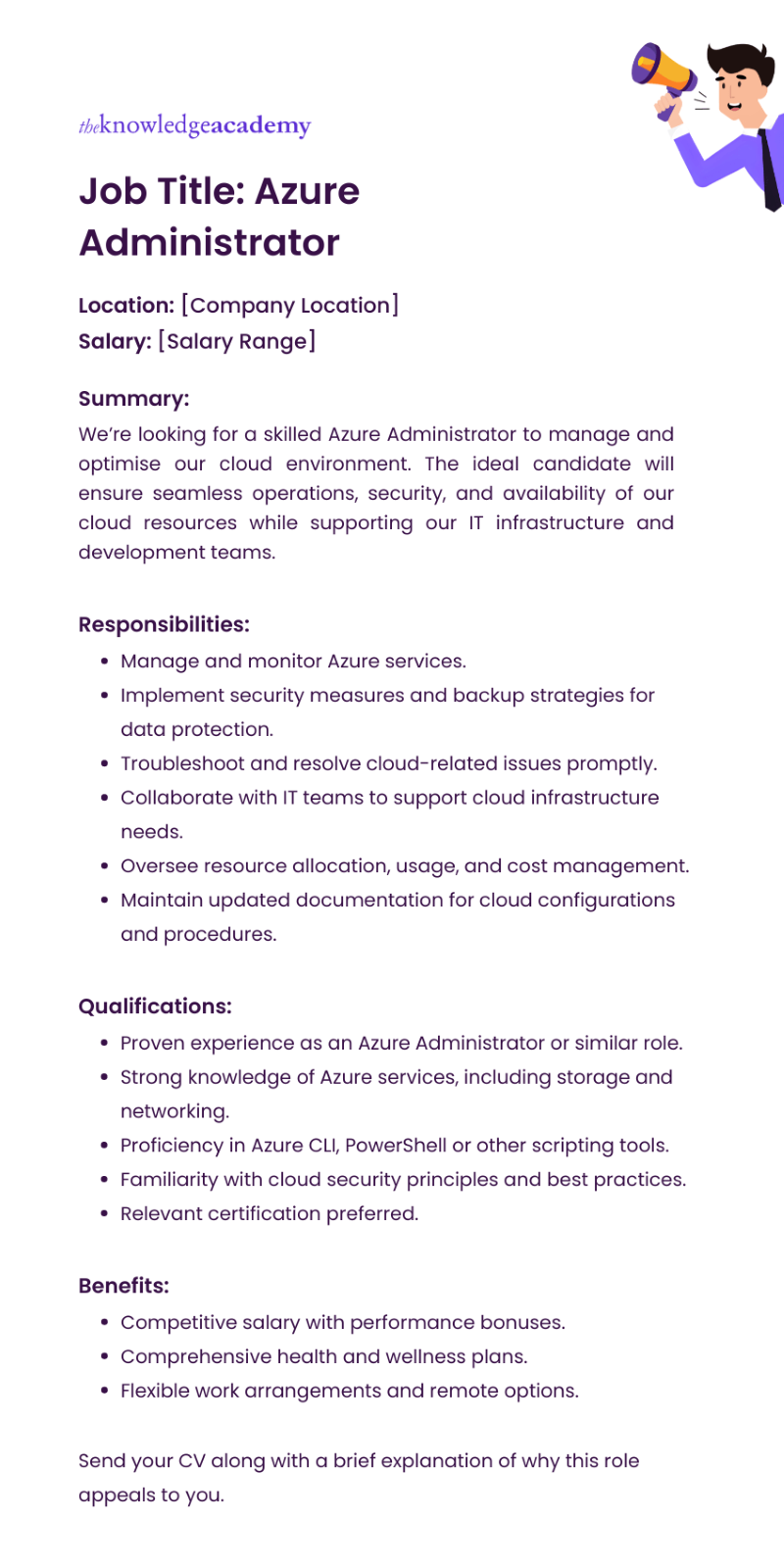
Azure Administrator Salary Insights
The Azure Administrator Salary can vary depending on factors such as certifications, location, industry demand, and employer size and type. Below is a detailed breakdown of the salary range across three major regions and experience levels:
1) Azure Administrator Salary in the UK:
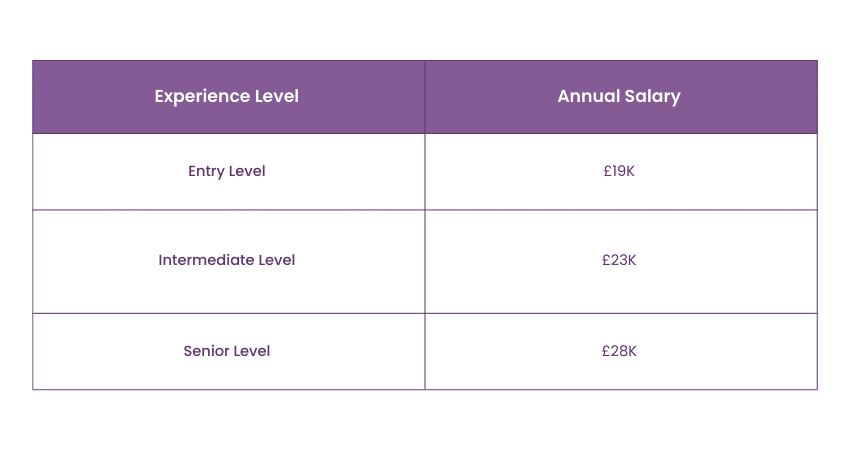
Source: Glassdoor
2) Azure Administrator Salary in the US:
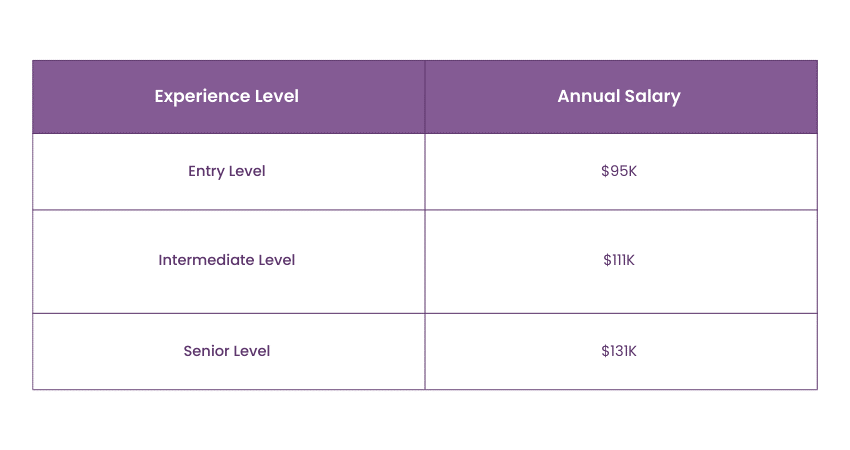
Source: Glassdoor
3) Azure Administrator Salary in India:
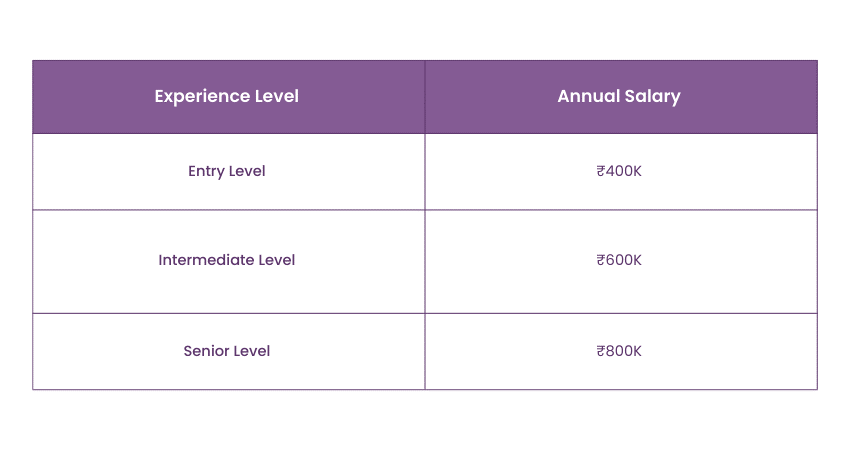
Source: Glassdoor
Conclusion
In conclusion, an Azure Administrator plays the crucial role of managing and optimising Cloud infrastructure. Their expertise ensures seamless operations, security, and scalability in a variety of business environments. With the rise in Cloud Technology adoption across industries, you can unlock rewarding career opportunities through the right certifications that align with the in-demand Azure administrator job description.
Looking to gain in-depth knowledge of core Azure services and architectural components? Sign up for our Microsoft Azure Fundamentals AZ-900 Certification Course now!
Frequently Asked Questions

Azure Administrators are in charge of:
a) Deploying Azure solutions
b) Resolving Azure services-related issues
c) Implementing and managing cost-effective Cloud systems
d) Configuring Azure services to meet organisational needs
e) Maintaining Azure profiles and subscriptions
f) Setting up public and private Cloud environments
g) Deploying workloads

Coding skills are not mandatory for Azure Administrators as they typically focus on configuring and managing resources, not developing applications. Even though coding skills can help automate tasks and troubleshoot problems, they are optional.

The Knowledge Academy takes global learning to new heights, offering over 30,000 online courses across 490+ locations in 220 countries. This expansive reach ensures accessibility and convenience for learners worldwide.
Alongside our diverse Online Course Catalogue, encompassing 19 major categories, we go the extra mile by providing a plethora of free educational Online Resources like News updates, Blogs, videos, webinars, and interview questions. Tailoring learning experiences further, professionals can maximise value with customisable Course Bundles of TKA.

The Knowledge Academy’s Knowledge Pass, a prepaid voucher, adds another layer of flexibility, allowing course bookings over a 12-month period. Join us on a journey where education knows no bounds.

The Knowledge Academy offers various Microsoft Azure Certification Courses, including the Microsoft Azure Fundamentals AZ-900 Course and the Microsoft Azure Administrator AZ104 Course. These courses cater to different skill levels, providing comprehensive insights into Azure Marketplace.
Our Microsoft Technical cover a range of topics related to Azure Administration, offering valuable resources, best practices, and industry insights. Whether you are a beginner or looking to advance your Azure Administrator skills, The Knowledge Academy's diverse courses and informative blogs have got you covered.
Upcoming Microsoft Technical Resources Batches & Dates
Date
 Microsoft Azure Administrator AZ104
Microsoft Azure Administrator AZ104
Mon 13th Jan 2025
Mon 10th Mar 2025
Mon 19th May 2025
Mon 21st Jul 2025
Mon 15th Sep 2025
Mon 17th Nov 2025
Mon 15th Dec 2025







 Top Rated Course
Top Rated Course



 If you wish to make any changes to your course, please
If you wish to make any changes to your course, please


